-
ORIGINAL ARTICLE01-10-2024
Micro and macropolitical determinants for non-vaccination against COVID-19 in pregnant women in Belo Horizonte
Revista Brasileira de Enfermagem. 2024;77:e20230235
Abstract
ORIGINAL ARTICLEMicro and macropolitical determinants for non-vaccination against COVID-19 in pregnant women in Belo Horizonte
Revista Brasileira de Enfermagem. 2024;77:e20230235
DOI 10.1590/0034-7167-2023-0235
Views0See moreABSTRACT
Objective:
To analyze the determinants for non-vaccination against COVID-19 in pregnant women in Belo Horizonte, Minas Gerais, Brazil.
Methods:
An epidemiological study with a cross-sectional design was conducted using data from the project titled “Childbirth and Breastfeeding in Children of Mothers Infected by SARS-CoV-2,” developed during the pandemic in the city of Belo Horizonte, Minas Gerais, Brazil.
Results:
The study sample consisted of 360 pregnant women, of whom 77.89% received the COVID-19 vaccine. External, social, and institutional determinants can influence lower adherence to COVID-19 vaccination, especially the absence of employment during pregnancy, difficult access to prenatal consultations, and a compromised or deficient support network.
Conclusions:
In light of this scenario, greater encouragement for health education is necessary, especially during prenatal care, resulting in lower rates of morbidity and mortality and favorable perinatal outcomes.
-
ORIGINAL ARTICLE01-10-2024
COVID-19: Training activities, adherence, and use of personal protective equipment in Primary Health Care
Revista Brasileira de Enfermagem. 2024;77:e20230179
Abstract
ORIGINAL ARTICLECOVID-19: Training activities, adherence, and use of personal protective equipment in Primary Health Care
Revista Brasileira de Enfermagem. 2024;77:e20230179
DOI 10.1590/0034-7167-2023-0179
Views0ABSTRACT
Objective:
to analyze the association between participation in training activities and the adherence to and use of personal protective equipment by workers and professionals involved in Health Residency Programs in Primary Health Care during the COVID-19 pandemic.
Methods:
a cross-sectional study in Brazil between August/2020 and March/2021. We utilized the EPI-APS COVID-19 instrument and its adapted version for resident professionals.
Results:
455 PHC workers and 102 residents participated in the study. Among them, 54.5% and 55.9%, respectively, engaged in training activities. We observed an association between participation in training activities and the proper use of gloves (p<0.001), gowns (p=0.009), goggles/face shields (p=0.002), and overall adherence (p<0.001) among PHC workers, and the proper use of surgical masks (p=0.028) among residents. Adherence rates of ≥75% were identified in 6.9% of PHC workers and none among the residents.
Conclusion:
training activities are associated with increased adherence to and proper use of PPE.
Keywords:COVID-19Health PersonnelPersonal Protective EquipmentPrimary Health CareTraining ActivitiesSee more -
ORIGINAL ARTICLE12-16-2024
Software for the care of people with cardiovascular risk: construction and evidence of validity
Revista Brasileira de Enfermagem. 2024;77(6):e20240276
Abstract
ORIGINAL ARTICLESoftware for the care of people with cardiovascular risk: construction and evidence of validity
Revista Brasileira de Enfermagem. 2024;77(6):e20240276
DOI 10.1590/0034-7167-2024-0276
Views0See moreABSTRACT
Objectives:
to build and validate software for the care of people with cardiovascular risk.
Methods:
a methodological study, applied to software development, anchored in a nursing theory and classification system, in three stages: 1) requirements engineering; 2) software architecture and coding; and 3) testing and content validity by 12 experts in computer science, with a Content Validity Ratio score.
Results:
called e-TEORISC, in software format, for nursing care for people with cardiovascular risk, online and offline, containing a database linked to the Nursing Process stages. Experts considered that the attributes of functional suitability, performance efficiency, reliability, maintainability, usability, safety and portability obtained desirable scores.
Conclusions:
e-TEORISC has evidence of validity to instrumentalize care for people at cardiovascular risk, with potential for technology transfer to the Brazilian Health System.

-
ORIGINAL ARTICLE12-16-2024
Sleep quality of patients with heart failure and associated factors
Revista Brasileira de Enfermagem. 2024;77(6):e20240244
Abstract
ORIGINAL ARTICLESleep quality of patients with heart failure and associated factors
Revista Brasileira de Enfermagem. 2024;77(6):e20240244
DOI 10.1590/0034-7167-2024-0244
Views0See moreABSTRACT
Objectives:
to assess sleep quality of patients with heart failure and associated sociodemographic and clinical characteristics.
Methods:
a cross-sectional study, developed with 88 patients. Sleep quality was assessed by the Pittsburgh Sleep Quality Index. The data were analyzed using descriptive and inferential statistics.
Results:
the mean sleep quality score was 8.59 ± 3.60 points. 83% of participants were classified as poor sleepers. The number of hours of sleep was 5.99 ± 1.48. Family income of up to one minimum wage and functional class were significantly associated with poor sleepers. There was a positive correlation between functional class and poor sleep quality.
Conclusions:
a high frequency of poor sleepers was identified. Worse scores were associated with family income and symptomatic functional class. Health interventions are necessary to control sleep quality, especially in relation to health functionality.
-
ORIGINAL ARTICLE12-16-2024
Religión y experiencia profesional: ¿Serán predictores de la inteligencia espiritual de los enfermeros? Estudio transversal
Revista Brasileira de Enfermagem. 2024;77(6):e20240217
Abstract
ORIGINAL ARTICLEReligión y experiencia profesional: ¿Serán predictores de la inteligencia espiritual de los enfermeros? Estudio transversal
Revista Brasileira de Enfermagem. 2024;77(6):e20240217
DOI 10.1590/0034-7167-2024-0217es
Views0See moreRESUMEN
Objetivos:
analizar la relación entre religión y experiencia profesional con la inteligencia espiritual en enfermeros.
Métodos:
estudio transversal y analítico realizado en 2021, participaron 544 profesionales de enfermería que laboraban en establecimiento de salud de Perú durante la pandemia por COVID-19. Para el análisis de los datos se emplearon el análisis de regresión múltiple y correlación de Pearson.
Resultados:
en los enfermeros predominó un nivel de inteligencia espiritual saludable (42,8%). Quienes no profesaban una religión tenían mayor probabilidad de tener menor puntaje de inteligencia espiritual (escala global y dimensiones); sin embargo, los enfermeros expertos tuvieron mayor probabilidad de tener mayor inteligencia espiritual (escala global y dimensiones) que los enfermeros novatos (p<0,05).
Conclusiones:
la inteligencia espiritual en los enfermeros fue predicha por la religión y la experiencia profesional. Este hallazgo sugiere que la inteligencia espiritual en enfermería se consolida mediante prácticas religiosas y durante el ejercicio profesional.
-
ORIGINAL ARTICLE12-16-2024
Religion and professional experience: Are they predictors of nurses’ spiritual intelligence? Cross-sectional study
Revista Brasileira de Enfermagem. 2024;77(6):e20240217
Abstract
ORIGINAL ARTICLEReligion and professional experience: Are they predictors of nurses’ spiritual intelligence? Cross-sectional study
Revista Brasileira de Enfermagem. 2024;77(6):e20240217
DOI 10.1590/0034-7167-2024-0217
Views0See moreABSTRACT
Objectives:
to analyze the relationship between religion and professional experience with spiritual intelligence in nurses
Methods:
cross-sectional and analytical study carried out in 2021, with the participation of 544 nursing professionals working in health facilities in Peru during the COVID-19 pandemic. Multiple regression analysis and Pearson’s correlation were used to analyze the data.
Results:
in nurses, a healthy level of spiritual intelligence predominated (42.8%). Those who did not profess a religion were more likely to have a lower spiritual intelligence score (global scale and dimensions); however, experienced nurses were more likely to have higher spiritual intelligence (global scale and dimensions) than novice nurses (p<0.05).
Conclusions:
spiritual intelligence in nurses was predicted by religion and professional experience. This finding suggests that spiritual intelligence in nursing is consolidated through religious practices and during professional practice.
-
ORIGINAL ARTICLE12-16-2024
Effectiveness of the modified Seldinger technique for peripheral central catheter in newborns: a randomized clinical trial
Revista Brasileira de Enfermagem. 2024;77(6):e20240189
Abstract
ORIGINAL ARTICLEEffectiveness of the modified Seldinger technique for peripheral central catheter in newborns: a randomized clinical trial
Revista Brasileira de Enfermagem. 2024;77(6):e20240189
DOI 10.1590/0034-7167-2024-0189
Views0ABSTRACT
Objectives:
to evaluate the effectiveness of peripheral central catheterization by comparing the modified Seldinger technique and the conventional technique in critically ill newborns.
Methods:
randomized unmasked clinical trial conducted in a public children’s hospital. Participation of 111 newborns with randomized allocation, 56 in the control group (conventional technique) and 55 in the experimental group (modified Seldinger). Success and absence of complications were evaluated as primary outcomes. The pain scale, difficulty in hemostasis, procedure time and number of punctures were considered secondary outcomes.
Results:
there was no statistical significance between groups, either for success (p=0.705) or absence of complications (p=0.347). A lower pain score, improved hemostasis, increased assertiveness with fewer punctures and reduced procedure time were not observed in the experimental group.
Conclusions:
the modified Seldinger technique did not prove to be a more effective insertion technology compared to the conventional method. Brazilian Clinical Trial Registry: RBR-69vks36.
Keywords:Comparative Effectiveness ResearchNewbornPeripheral CatheterizationRandomized Controlled TrialTechnologySee more
-
ORIGINAL ARTICLE12-16-2024
Narratives of sex workers: intimate partner violence and coping strategies
Revista Brasileira de Enfermagem. 2024;77(6):e20240180
Abstract
ORIGINAL ARTICLENarratives of sex workers: intimate partner violence and coping strategies
Revista Brasileira de Enfermagem. 2024;77(6):e20240180
DOI 10.1590/0034-7167-2024-0180
Views0See moreABSTRACT
Objectives:
to understand the narratives of sex workers about violence suffered by intimate partners and their coping strategies.
Methods:
qualitative research, focused on thematic oral history, carried out with six sex workers in southern Brazil, who responded to in-depth interviews using a flexible script. Thematic content analysis was used.
Results:
the study included cisgender women who self-identified as half black and half white. Most had children and were separated. They reported abusive relationships by their intimate partners, with emphasis on verbal, psychological, financial, and physical violence and attempted femicide. Such violence resulted in coping strategies, such as avoiding emotional bonds and maintaining a discreet life.
Final Considerations:
intimate partner violence is prevalent among participants, leading them to adopt strategies to preserve their safety and well-being, highlighting the need for public policies that meet their particularities and guarantee protection.
-
REVIEW05-13-2024
Technologies used in the treatment of burn victims in intensive care: a scope review
Revista Brasileira de Enfermagem. 2024;77(1):e20220738
Abstract
REVIEWTechnologies used in the treatment of burn victims in intensive care: a scope review
Revista Brasileira de Enfermagem. 2024;77(1):e20220738
DOI 10.1590/0034-7167-2022-0738
Views0See moreABSTRACT
Objectives:
to analyze the technologies used by the nursing team in the treatment of skin lesions caused by burns in patients under intensive care.
Methods:
this is a scope review conducted on the LILACS, Medline, PubMed, and CINAHL databases without temporal or language restrictions.
Results:
the highlighted technologies included the use of specialized dressings, biological agents such as probiotics and cyanobacteria, as well as negative pressure therapies and enzymes such as papain and collagenase. Some technologies, such as nanocrystalline silver, demonstrated efficacy in infection control.
Final Considerations:
the study identified essential technologies in burn care, emphasizing the need for further research on “soft” technologies. The findings support the promotion of evidence-based nursing care for burn patients in intensive care and enhance knowledge about effective treatments.
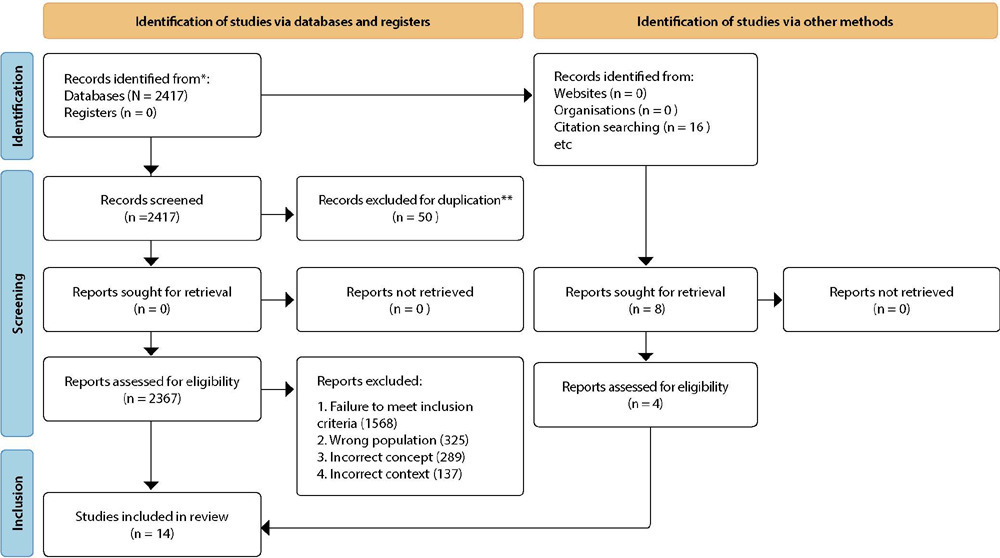
-
ORIGINAL ARTICLE05-03-2024
Cancer patient satisfaction regarding the quality of information received: psychometric validity of EORTC QLQ-INFO25
Revista Brasileira de Enfermagem. 2024;77(1):e20230358
Abstract
ORIGINAL ARTICLECancer patient satisfaction regarding the quality of information received: psychometric validity of EORTC QLQ-INFO25
Revista Brasileira de Enfermagem. 2024;77(1):e20230358
DOI 10.1590/0034-7167-2023-0358
Views0See moreABSTRACT
Objectives:
to psychometrically validate the European Organization for Research and Treatment of Cancer Core Quality of Life Questionnaire EORTC QLQ-INFO25 instrument and identify the domains that influence patients’ perception of the information received.
Methods:
a cross-sectional methodology with cancer patients in a Brazilian philanthropic hospital institution. Sociodemographic and clinical instruments, EORTC QLQ-C30, EORTC QLQ-INFO25 and Supportive Care Needs Survey – Short Form 34 were used. Analysis occurred using Cronbach’s alpha coefficients, intraclass correlation, test-retest and exploratory factor analysis.
Results:
128 respondents participated. Cronbach’s alpha coefficient was 0.85. The test-retest obtained p-value=0.21. In the factor analysis, one item was excluded. Satisfaction with the information received was 74%, with three areas with averages below 70%. In open-ended questions, there was a greater desire for information.
Conclusions:
validity evidence was obtained with instrument reliability, consistency and stability. Respondents expressed satisfaction with the information received.
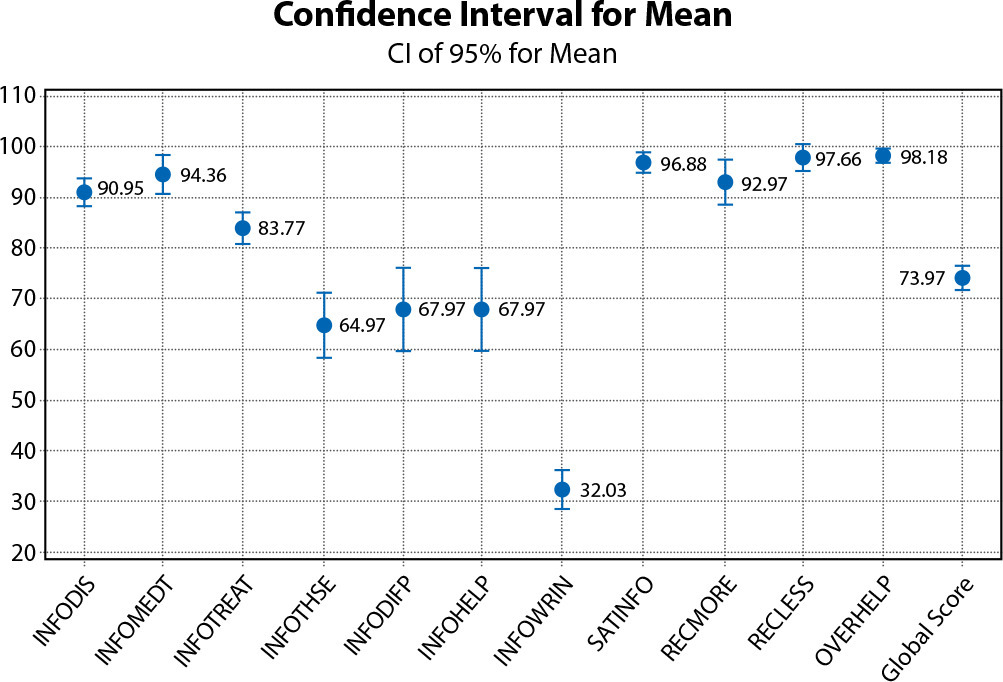
-
REVIEW05-03-2024
Intervenções de Enfermagem para capacitar o cuidador familiar de uma pessoa com amputação de membro inferior: revisão de escopo
Revista Brasileira de Enfermagem. 2024;77(1):e20230264
Abstract
REVIEWIntervenções de Enfermagem para capacitar o cuidador familiar de uma pessoa com amputação de membro inferior: revisão de escopo
Revista Brasileira de Enfermagem. 2024;77(1):e20230264
DOI 10.1590/0034-7167-2023-0264
Views0See moreRESUMEN
Objetivos:
mapear intervenciones de enfermería que capaciten al cuidador familiar de la persona con amputación de miembro inferior para su rol.
Métodos:
es una revisión de alcance guiada por la metodología del Instituto Joanna Briggs, llevada a cabo en diferentes bases de datos (incluyendo literatura gris).
Resultados:
se tuvieron en cuenta seis estudios publicados entre 2009 y 2021, a saber: intervenciones de asesoramiento y apoyo para pacientes y familiares; intervenciones de apoyo entre iguales realizadas por un par de profesionales certificados; participación de cuidadores o familiares en grupos de apoyo e intervenciones clave para el equilibrio psicológico del paciente y del cuidador familiar. Dos estudios analizaron la importancia de la formación del cuidador y del amputado y del desarrollo de habilidades de afrontamiento. Otro estudio recomendó intervenciones de apoyo informativo para los cuidadores en relación con el cuidado del amputado y su adaptación a la vida hogareña.
Conclusiones:
los resultados de esta revisión permiten identificar recomendaciones/directrices para la práctica y recomendaciones/sugerencias de intervenciones según las necesidades identificadas de los cuidadores familiares de pacientes con amputación de miembros inferiores.
-
REVIEW05-03-2024
Nursing interventions to empower the family caregiver of person with lower limb amputation: scoping review
Revista Brasileira de Enfermagem. 2024;77(1):e20230264
Abstract
REVIEWNursing interventions to empower the family caregiver of person with lower limb amputation: scoping review
Revista Brasileira de Enfermagem. 2024;77(1):e20230264
DOI 10.1590/0034-7167-2023-0264
Views0See moreABSTRACT
Objectives:
to map nursing interventions that empower the Family caregiver of the person with lower limb amputation for is role.
Methods:
scoping review guided by Joanna Briggs Institute methodology conducted in different databases (including gray literature).
Results:
six studies published between 2009 and 2021 were included. Interventions of counselling and support for patients and family; peer support interventions performed by a certified pair; involvement of caregivers or family members in support groups; and key interventions for patient and family caregiver psychological balance. Two studies discussed the importance of caregiver and amputee training and development of coping skills. Another study recommended Interventions of informative support for caregivers regarding care for the amputee and adaptation to home.
Conclusions:
results of this review allow the identification of recommendations (guidelines) for practice and recommendations/suggestions for interventions according with identified needs of family caregivers of patients with lower limb amputation.
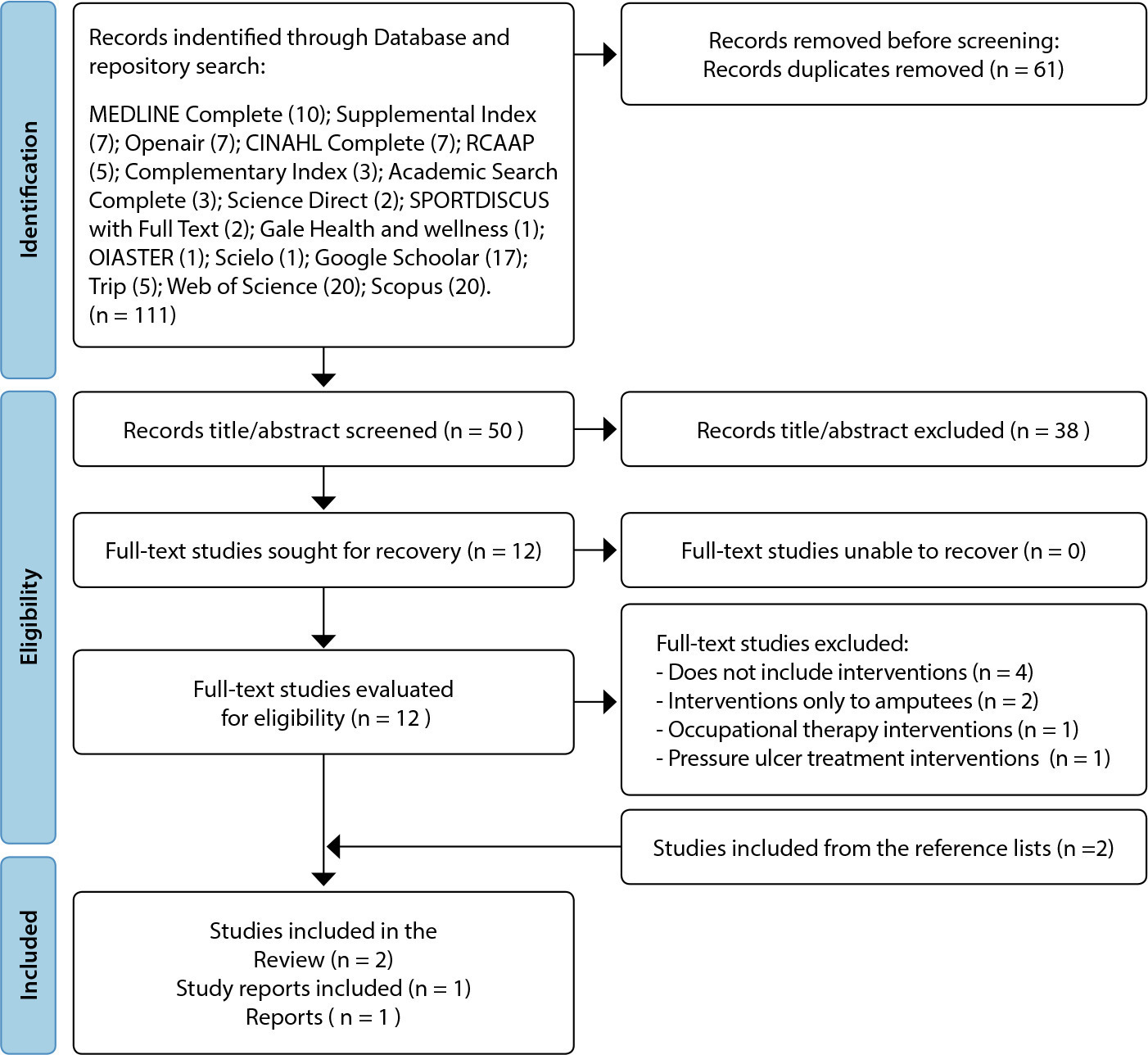
-
ORIGINAL ARTICLE05-03-2024
Pregnancy loss in women with systemic lupus erythematosus: Grounded Theory
Revista Brasileira de Enfermagem. 2024;77(1):e20230225
Abstract
ORIGINAL ARTICLEPregnancy loss in women with systemic lupus erythematosus: Grounded Theory
Revista Brasileira de Enfermagem. 2024;77(1):e20230225
DOI 10.1590/0034-7167-2023-0225
Views0ABSTRACT
Objective:
to learn the meanings attributed to pregnancy loss by women with Lupus.
Method:
qualitative research, based on Symbolic Interactionism and Grounded Theory. Data collection took place between January and August 2022 through in-depth interviews. Data analysis went through the stages of initial and focused coding.
Results:
seventeen women participated. The central phenomenon “The climb to motherhood: falls and overcoming” was constructed, consisting of three categories: “Falling to the ground during the climb: the experience of pregnancy loss”; “Getting up and following the path: new attempts to conceive”; and “Remembering the journey: meanings attributed to pregnancy losses”.
Final considerations:
experiencing pregnancy is, analogously, like climbing a mountain, where obstacles need to be overcome to reach the summit. The experience of pregnancy loss is seen as complex, especially when there is fragility in healthcare and a lack of awareness regarding feelings of loss and grief.
Keywords:AbortionGrounded TheoryHigh-RiskPregnancySpontaneousSymbolic InteractionismSystemic Lupus ErythematosusSee more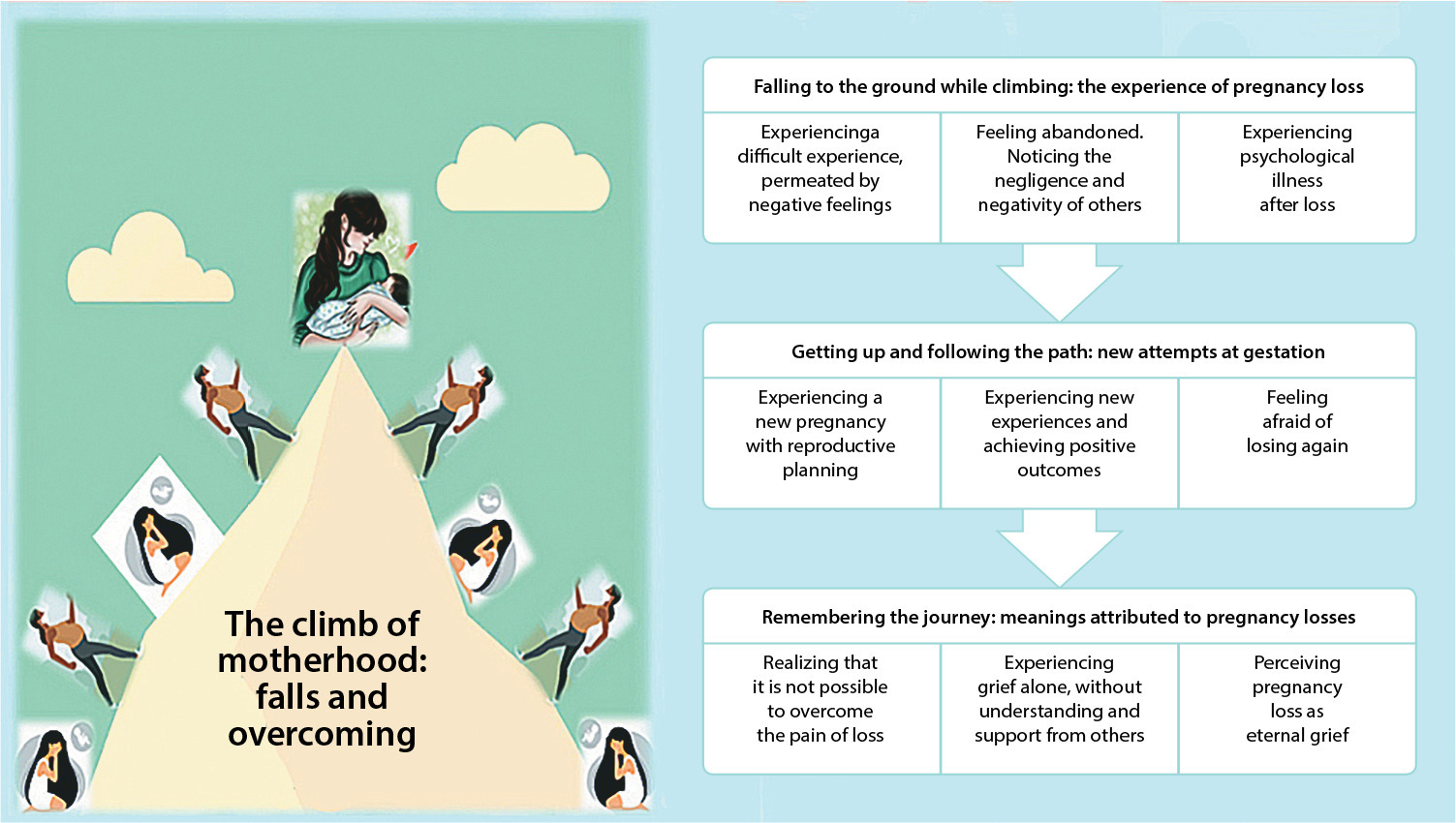
-
ORIGINAL ARTICLE05-03-2024
Josicélia Dumêt Fernandes’ professional trajectory: contributions to psychiatric and mental health nursing
Revista Brasileira de Enfermagem. 2024;77(1):e20230174
Abstract
ORIGINAL ARTICLEJosicélia Dumêt Fernandes’ professional trajectory: contributions to psychiatric and mental health nursing
Revista Brasileira de Enfermagem. 2024;77(1):e20230174
DOI 10.1590/0034-7167-2023-0174
Views0See moreABSTRACT
Objectives:
to analyze nurse Josicélia Dumêt Fernandes’ life story, with emphasis on her work in the psychiatry and mental health fields.
Methods:
historical, qualitative research. Semi-structured interviews and documentary research were used as data collection techniques, collected from September to October 2021. For data analysis, we opted for the content analysis method and comparison with the Foucauldian philosophical framework.
Results:
four categories emerged: Transforming herself and mental health practices; (Re)framing professional practice; Nursing practice and power relations; and The paths and implications in the psychiatry and mental health fields.
Final Considerations:
the study of the biographer demonstrates a search for transformation of herself and mental health practices, with a rupture in paradigms and reframing of her practice in psychiatry and mental health.
-
ORIGINAL ARTICLE05-03-2024
Propiedades psicométricas de la versión chilena del cuestionario de calidad de vida para mieloma múltiple
Revista Brasileira de Enfermagem. 2024;77(1):e20230100
Abstract
ORIGINAL ARTICLEPropiedades psicométricas de la versión chilena del cuestionario de calidad de vida para mieloma múltiple
Revista Brasileira de Enfermagem. 2024;77(1):e20230100
DOI 10.1590/0034-7167-2023-0100es
Views0See moreRESUMEN
Objetivos:
Evaluar consistencia interna y validez de constructo del QLQ-MY20 para valoración de calidad de vida en sobrevivientes de mieloma múltiple en Chile.
Métodos:
Estudio transversal, realizado entre marzo 2020 y diciembre 2022. Participaron 118 personas de dos hospitales públicos. Se utilizaron los cuestionarios QLQ-C30 y QLQ-MY20. Fueron evaluadas la consistencia interna con alfa de Cronbach (α) y validez de constructo mediante pruebas de hipótesis (Mann Whitney y correlación de Spearman).
Resultados:
El promedio de edad de los participantes era 67,2 (DE=9,2) años. Consistencia interna para escala completa (α=0,779), dimensión “síntomas de la enfermedad” (α=0,671), dimensión “efectos secundarios de los tratamientos” (α=0,538) y dimensión “perspectiva de futuro” (α=0,670). Se comprobaron cuatro de las cinco hipótesis de la validez de constructo: presentaron más síntomas las mujeres, personas con peor performance estatus, con dolor y con peor fatiga.
Conclusiones:
La versión chilena del QLQ-MY20 presenta adecuada consistencia interna y validez de constructo.
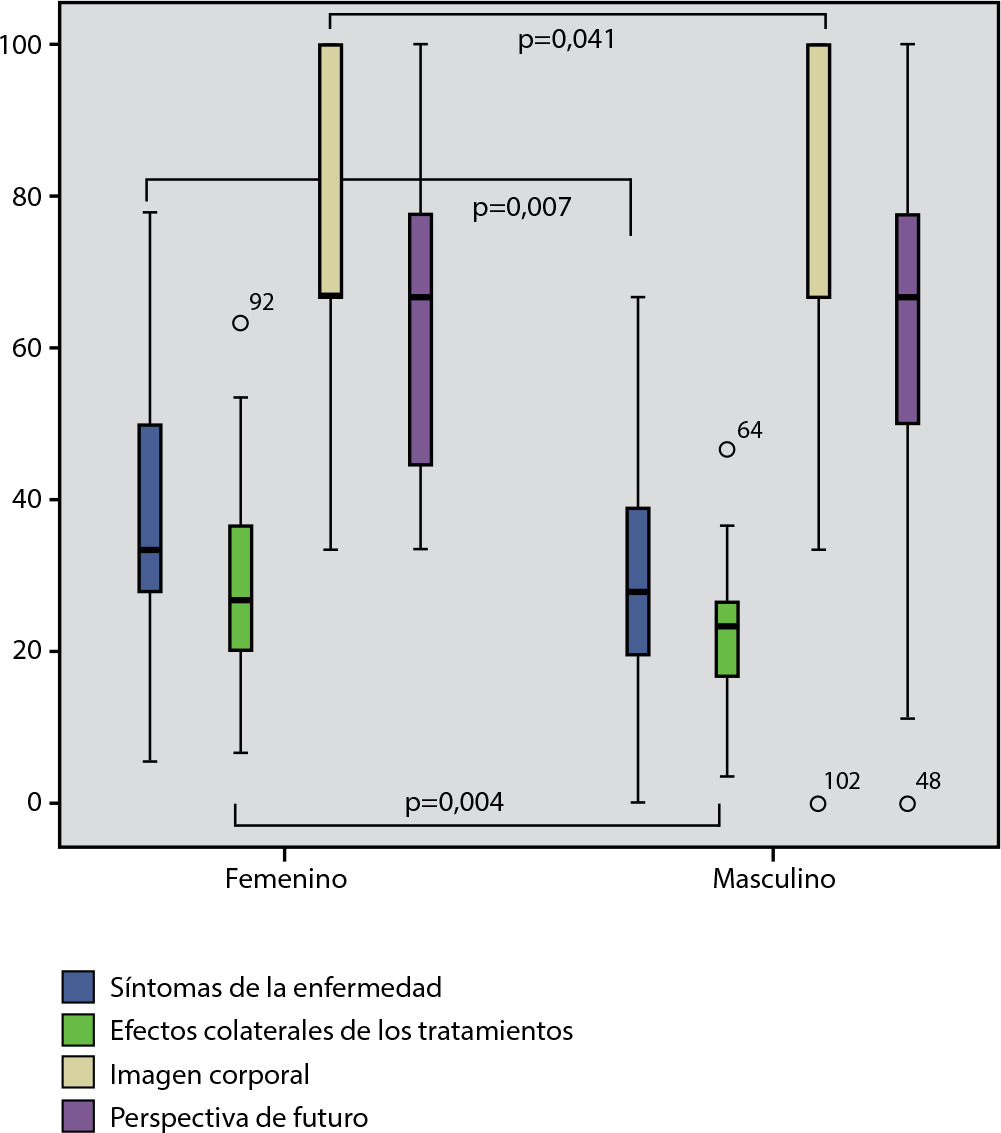
-
ORIGINAL ARTICLE05-03-2024
Psychometric properties of the Chilean version of the quality of life questionnaire for multiple myeloma
Revista Brasileira de Enfermagem. 2024;77(1):e20230100
Abstract
ORIGINAL ARTICLEPsychometric properties of the Chilean version of the quality of life questionnaire for multiple myeloma
Revista Brasileira de Enfermagem. 2024;77(1):e20230100
DOI 10.1590/0034-7167-2023-0100
Views0See moreABSTRACT
Objectives:
To evaluate the internal consistency and construct validity of the QLQ-MY20 for assessing the quality of life in multiple myeloma survivors in Chile.
Methods:
This was a cross-sectional study conducted between March 2020 and December 2022. It involved 118 individuals from two public hospitals. The QLQ-C30 and QLQ-MY20 questionnaires were used. Internal consistency was assessed using Cronbach’s alpha(α), and construct validity was evaluated through hypothesis testing (Mann-Whitney and Spearman correlation).
Results:
The average age of participants was 67.2 years (SD=9.2). Internal consistency for the complete scale was α=0.779, for the “disease symptoms” dimension α=0.671, for the “side effects of treatments” dimension α=0.538, and for the “future perspective” dimension α=0.670. Four of the five construct validity hypotheses were confirmed: women, individuals with worse performance status, those with pain, and those with worse fatigue showed more symptoms.
Conclusions:
The Chilean version of the QLQ-MY20 demonstrates adequate internal consistency and construct validity.
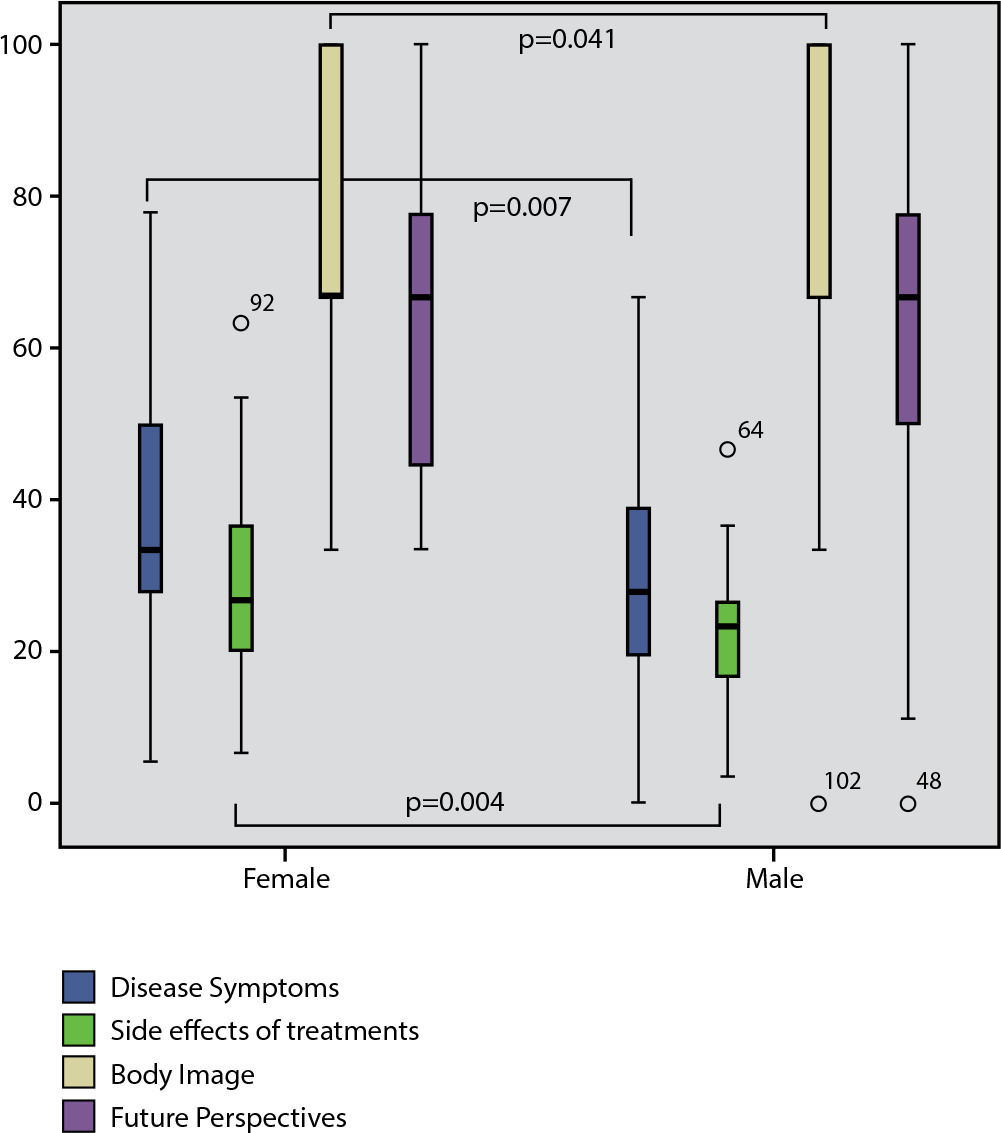
-
ORIGINAL ARTICLE10-09-2023
Intestinal parasitic infections: telephone health literacy with men in areas of poverty in the syndemic
Revista Brasileira de Enfermagem. 2023;76(4):e20220300
Abstract
ORIGINAL ARTICLEIntestinal parasitic infections: telephone health literacy with men in areas of poverty in the syndemic
Revista Brasileira de Enfermagem. 2023;76(4):e20220300
DOI 10.1590/0034-7167-2022-0300
Views0See moreABSTRACT
Objectives:
to assess Popular Health Education practices on intestinal parasites, carried out by telephone contact with men living in urban communities in Rio de Janeiro, Brazil, during the COVID-19 syndemic.
Method:
a quasi-experimental, quantitative and descriptive study, carried out with men aged 20 to 59 years. Pre-test was applied, and participants were divided into two groups: control and experimental. Popular Education in Health practices were carried out with an experimental group, and post-test was applied for both.
Results:
health education practices were significant in the experimental group, with a reduction in incorrect answers. There was an increase in incorrect answers in the control group’s post-test.
Conclusions:
the Brazilian National Policy for Popular Education in Health contributed to qualify men’s health literacy on intestinal parasites. Practice by telephone contact proved to be a powerful strategy for nursing and public policies to access this group and promote health in Primary Health Care.

-
Content validation of an instrument for medical record audits
Revista Brasileira de Enfermagem. 2023;76(4):e20220109
Abstract
Content validation of an instrument for medical record audits
Revista Brasileira de Enfermagem. 2023;76(4):e20220109
DOI 10.1590/0034-7167-2022-0109
Views0See moreABSTRACT
Objective:
To build and validate the content of an instrument to conduct medical record audits; to conduct a pre-test.
Methods:
Methodological study conducted from May/2020 to May/2021 in three stages: 1) development of the instrument by bibliographic survey and benchmarking; 2) content validation using the Delphi technique; 3) application of the instrument and descriptive analysis in a sample of 200 medical records.
Results:
An instrument was constructed with 11 domains containing sub-items that characterize the quality of care. Two stages of the Delphi technique were necessary to reach a content validity index higher than 0.90. For each domain, a graduated scale with a numerical value from 1 to 4 points was attributed, reflecting the quality of its completion. The average time of application was 35 minutes per record.
Conclusions:
The tool proved to be viable to support clinical audits to identify the level of excellence and reveal opportunities for improvement in care processes.
-
ORIGINAL ARTICLE10-09-2023
Factors associated with older adults’ knowledge, attitude and practice on skin cancer prevention
Revista Brasileira de Enfermagem. 2023;76(3):e20220606
Abstract
ORIGINAL ARTICLEFactors associated with older adults’ knowledge, attitude and practice on skin cancer prevention
Revista Brasileira de Enfermagem. 2023;76(3):e20220606
DOI 10.1590/0034-7167-2022-0606
Views0See moreABSTRACT
Objectives:
to identify factors associated with older adults’ knowledge, attitude and practice regarding skin cancer prevention.
Methods:
this is a cross-sectional study, carried out with 120 older adults from a Basic Health Unit in Quixadá, Ceará, from September to November 2018.
Results:
individuals aged 60 to 69 years and working were statistically associated with adequate knowledge (p=0.038). Having light skin, eyes and hair was associated with adequate attitude (p=0.030). Having skin problems, such as bleeding wounds, was associated with adequate practice (p=0.016). With regard to inappropriate behavior for skin cancer prevention, there was a statistically significant association between working or having worked under direct exposure to the sun, inadequate knowledge (p=0.036), inadequate attitude (p=0.010) and having incomplete primary education and inadequate practice (p<0.001).
Conclusions:
sociodemographic and clinical factors influence older adults’ knowledge, attitude and practice regarding skin cancer prevention.
-
ORIGINAL ARTICLE10-09-2023
Epidemiology of monkeypox notifications in the state of Minas Gerais, Brazil
Revista Brasileira de Enfermagem. 2023;76(3):e20220598
Abstract
ORIGINAL ARTICLEEpidemiology of monkeypox notifications in the state of Minas Gerais, Brazil
Revista Brasileira de Enfermagem. 2023;76(3):e20220598
DOI 10.1590/0034-7167-2022-0598
Views0See moreABSTRACT
Objectives:
to describe the epidemiological profile of suspected, confirmed, and probable cases of monkeypox in the state of Minas Gerais, Brazil.
Methods:
a descriptive, retrospective study of reported suspected, confirmed, and probable cases of monkeypox infection in the state of Minas Gerais, Brazil. The study period was from the first notification, on June 11, to September 7, 2022.
Results:
a total of 759 suspected, confirmed, and probable cases of monkeypox infection were reported, with 35.44% suspected, 53.75% confirmed, and 10.81% probable cases, respectively. As for the coexisting diseases within confirmed cases, 38.79% were related to people living with human immunodeficiency virus, and 13.74% had some active sexually transmitted infection. Regarding the evolution of confirmed cases, 47.43% were cured.
Conclusions:
the results contribute to greater knowledge and control of the infection by allowing better disease management and care offered in health services.
-
ORIGINAL ARTICLE10-09-2023
Elaboration of an educational video for cardiopulmonary resuscitation with chest compressions in adults
Revista Brasileira de Enfermagem. 2023;76(3):e20220367
Abstract
ORIGINAL ARTICLEElaboration of an educational video for cardiopulmonary resuscitation with chest compressions in adults
Revista Brasileira de Enfermagem. 2023;76(3):e20220367
DOI 10.1590/0034-7167-2022-0367
Views0ABSTRACT
Objectives:
to develop and analyze the face and content validity of a storyboard for constructing an educational video for training laypersons in cardiopulmonary resuscitation with only chest compressions in adults.
Methods:
a methodological study of storyboard elaboration and validity for producing an educational health video. The storyboard was submitted to analysis of 20 judges to assess its adequacy with the proposed objective. To assess the agreement between judges, the Content Validity Index was calculated. After validating the storyboard, video production took place.
Results:
the Content Validity Index met expectations. Its mean in each group was ≥ 0.90 (lay judges = 0.97; expert judges = 0.90; all judges = 0.94).
Conclusions:
the video produced is composed of scientific information, professional expertise and laypersons’ perceptions, making it important evidence for health education.
Keywords:Cardiopulmonary ResuscitationInstructional Film and VideoOut-of-Hospital Cardiac ArrestPublic Health NursingValidity StudySee more
-
ORIGINAL ARTICLE10-09-2023
Palliative care in nursing training: higher education course coordinators’ perception
Revista Brasileira de Enfermagem. 2023;76(3):e20220222
Abstract
ORIGINAL ARTICLEPalliative care in nursing training: higher education course coordinators’ perception
Revista Brasileira de Enfermagem. 2023;76(3):e20220222
DOI 10.1590/0034-7167-2022-0222
Views0See moreABSTRACT
Objectives:
to analyze undergraduate nursing course coordinators’ perception about nursing training in palliative care.
Methods:
a descriptive study, with a qualitative approach and thematic content analysis, carried out with coordinators of nursing courses in Higher Education Institutions in Rio Grande do Norte.
Results:
three thematic categories emerged: Nursing training in palliative care; Potentialities for teaching palliative care; and Challenges of teaching in palliative care. The coordinators described as potentialities: transversality, theoretical and practical approach, optional subject, university extensions, interdisciplinarity and transdisciplinary approach, and as challenges: biomedical model in health education and insufficient professor training.
Final Considerations:
palliative care teaching in the researched institutions in the nursing education process is approached in an incipient and fragmented way, and almost always without having a specific curricular component on the subject, being present as one of its contents.
-
ORIGINAL ARTICLE10-06-2023
Ethical problems in nursing teleconsultations for people living with HIV during the Covid-19 pandemic
Revista Brasileira de Enfermagem. 2023;76:e20220754
Abstract
ORIGINAL ARTICLEEthical problems in nursing teleconsultations for people living with HIV during the Covid-19 pandemic
Revista Brasileira de Enfermagem. 2023;76:e20220754
DOI 10.1590/0034-7167-2022-0754
Views0See moreABSTRACT
Objectives:
to understand the ethical problems experienced by primary health care nurses in using nursing teleconsultations for people living with the human immunodeficiency virus during the coronavirus pandemic.
Methods:
qualitative research, anchored in Constructivist Grounded Theory. Data was collected between July and September 2020, with 17 participants.
Results:
the first category highlights the ethical problems in conducting teleconsultations, managing high demand, communication barriers, and risks related to data security. The second emphasizes the potential of teleconsultations in communication and access, by generating changes in the work process and the use of protocols to guide clinical practice.
Conclusions:
nurses’ work in digital mode requires professional qualification, with a view to stimulating reflection on teleconsultation practice, ethical-moral deliberation and combating stigma, and also adopting data security-centered conduct.
-
Ethical dilemmas and illicit acts in nursing: reflections on the legal (dis)order
Revista Brasileira de Enfermagem. 2023;76:e20220558
Abstract
Ethical dilemmas and illicit acts in nursing: reflections on the legal (dis)order
Revista Brasileira de Enfermagem. 2023;76:e20220558
DOI 10.1590/0034-7167-2022-0558
Views0See moreABSTRACT
Objectives:
to reflect on aspects of the legal system that involve situations of ethical dilemmas and illegal acts applied in legal proceedings related to nursing professionals.
Methods:
theoretical-reflective essay anchored in conceptions issued by a Brazilian nursing class body, based on technical opinions, in articulation with examples extracted from judges of the Superior Court of Justice.
Results:
the legal sources demonstrated the need to support nursing practices through a due and clear understanding of the notions addressed. Indeed, ethical dilemmas linked to professional practice usually refer to the psychological impact of having to act differently from what feels morally, ethically, or professionally appropriate.
Final Considerations:
the reflection was guided by conceptual and legal issues involving nursing practice, pointing to the need to monitor the effects of legal disorder caused by current legislation, which may have implications for the legal security of professionals.
Search
Search in:
Nuvem de Tags
Aged (144) Atenção Primária à Saúde (239) COVID-19 (104) Cuidados de Enfermagem (269) Educação em Enfermagem (151) Educação em Saúde (139) Enfermagem (930) Estudos de Validação (131) Health Education (144) Idoso (208) Mental Health (149) Nursing (987) Nursing Care (306) Patient Safety (151) Primary Health Care (284) Qualidade de Vida (104) Quality of Life (106) Saúde Mental (145) Segurança do Paciente (150) Validation Studies (108)



